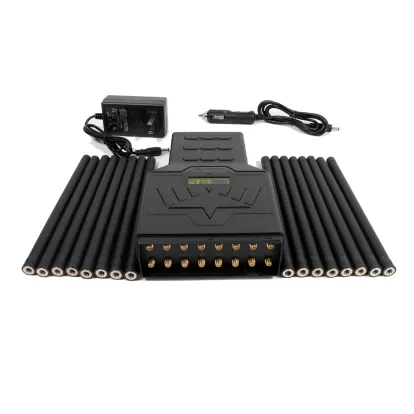In response to employees being found with $2.5 million worth of contraband, the state prison system has taken steps to track illegal phones within its facilities
The South Carolina Department of Corrections (SCDC) is currently developing an innovative approach to detect unauthorized cell phones within its prison system in Columbia, S.C. (WIS).

The recent unveiling of a groundbreaking mobile phone tracking experiment followed the apprehension and legal charges brought against two SCDC officers involved in a significant contraband confiscation at the Broad River Correctional Institution on July 1st.
Alexis Simone Tucker, a 27-year-old resident of Columbia, has been accused of engaging in the illegal activities of trafficking methamphetamines weighing 400 grams or more, trafficking cocaine exceeding 200 grams, possessing marijuana with the intent to distribute, providing contraband to prisoners, committing misconduct in office, and participating in a drug conspiracy.
The prison investigators reported that Tucker smuggled multiple packages of illegal items hidden within a transparent work bag labeled with the initials SCDC.
Jorge L. Romero Navarro, a 46-year-old resident of Columbia, is facing charges of misconduct in office and drug conspiracy.
Navarro was taken into custody in connection with Tucker due to allegations that he ignored Tucker's act of introducing contraband into the prison.
According to the SCDC, the overall illicit items seized comprised 3,249 grams of marijuana, 1,485 grams of tobacco, 982 cigar wraps, 605 grams of methamphetamine, 217 grams of cocaine, 27 cellphones, chargers, game controllers, air pods, and various other unlawful items.
SCDC Director Bryan Stirling emphasized the extensive surveillance system in place, with an abundance of cameras scattered throughout various locations. This vast network enables us to closely monitor and comprehend ongoing activities.
Stirling expressed his disappointment to WIS regarding the involvement of his staff in criminal activities. However, he emphasized that the interception on Saturday served as a reminder of the crucial role cell phone jammer play in state prisons.
Stirling asserts that the topic of signal jamming wifi has been extensively debated at the national level for almost two decades. The primary objective of this concept is to obstruct cellular network access within prisons, thereby thwarting inmates from participating in illicit activities facilitated by contraband mobile phones.
Despite ongoing discussions for the past twenty years, the utilization of technology that obstructs mobile calls remains illegal in the United States.
During the interim period, we engaged in negotiations with the industry to secure the option of deactivating these phones. It is important to note that this is not signal jamming, and it will not result in an immediate shutdown of the phone. However, its purpose is to assist us in identifying the phones, as stated by Stirling.
SCDC is set to pioneer a groundbreaking approach this summer by being the first correctional system to test a novel method of tracking down cell phones used by inmates.
According to Stirling, the test will depend on the identification of mobile devices when inmates make illegal calls from within the prison walls, as reported to WIS.
SCDC will possess the capability to remotely deactivate the device by reaching out to the service provider once the mobile IDs have been intercepted.
After conducting thorough testing, our next step is to approach the FCC and present our functional product, requesting their permission to proceed. Once we obtain their approval, we will utilize the funds available to implement this solution across all our correctional facilities. If our efforts prove successful, our plan is to advocate for the widespread adoption of this technology by engaging with the legislature.
Currently, it has been reported that cell phones are being sold for around $6,000 within correctional facilities.
Stirling aims to maximize the number of phones being turned off in order to push the price to unattainable levels.
Stirling concluded that if we can begin to power down cell phones, we will witness a significant decrease in criminal activities, both within and beyond prison walls. The prevalence of drug trafficking, violence, and other related incidents would notably diminish. It is important to acknowledge that numerous occurrences within prisons have a direct impact on the external environment.
The SCDC is unable to disclose the anticipated commencement or completion time of the test.
Tucker and Navarro were previously held at the Alvin S. Glenn Detention Center; however, authorities have confirmed that they have now been released.
Should you come across any spelling or grammar errors in this article, kindly click or tap here to report them, including the article's headline.


Comments
Post a Comment